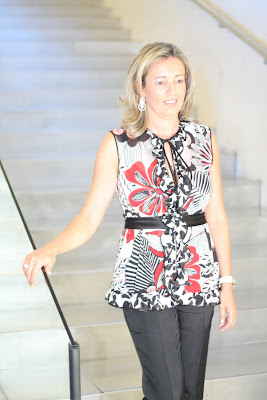 Tuesday, November 16, 2010
Tuesday, November 16, 2010Growing Up with Grace
Grace Patricia Kelly was born on November 12, 1929, the third of four children, to John Brendan “Jack” Kelly and Margaret Katherine Majer Kelly. Her father was the son of poor Irish immigrants who firmly instilled two things in their children: the importance of religion (they were devout Roman Catholics) and the importance of economic success. Jack Kelly had done just that, striking it rich and becoming a very wealthy man as well as a decorated Olympian. Because of this he pushed athletic excellence on his own children almost from the day they were born. Margaret Kelly was a very strict German woman who ran a tight ship with her children, who tended to prefer their father even though he pushed them through a rigorous exercise schedule every day. Little Grace was loved as a child but did not exactly fill the expectations of her parents. For an athletic champion like Jack Kelly any sort of physical imperfection was unthinkable and Grace had a few.
Early on it was noticed that Grace squinted a lot. She clearly needed glasses but never got them, her squinting was dismissed as simply an unattractive habit and her inability to catch a ball was attributed to poor coordination. Perhaps because of this Grace was rather withdrawn, considered a daydreamer and so on. Grace seemed to be the awkward child, was too often ill with some ailment or other and was generally considered a rather odd duck. Like the rest of her siblings Grace went to a strict Catholic school before her socially conscious grandmother (‘Ma Kelly’) prevailed upon her parents to move her and her sisters to a more elite secular school. While the other girls carried on well enough, Grace worried her mother. She was too withdrawn, content to play by herself, caught colds frequently and spent her free time performing plays with her dolls. Early on Grace had caught the acting bug.
When Grace was only 12 she joined the East Falls Old Academy Players, encouraged by her uncle George Kelly who had made a career in the theater though her parents, particularly her mother, disapproved of Uncle George, both because of his homosexuality and because they considered the acting profession a largely immoral lot. He received much of the “blame” for Grace, always the odd one out, setting out on the path of becoming an actress. Margaret Kelly tried to dissuade her daughter, insisting that women had hobbies, not professions, and that the most important thing was finding a good husband and becoming a good mother. Lest anyone take too harsh a view of Grace’s mother (who could be a bit of a tyrant at times according to her own children) she had herself given up a career in education to devote herself to her family and she knew the importance of taking the time to find the right spouse before getting married. Grace’s parents had a rather unhappy marriage but stayed together because, especially at that time, for Catholics divorce was unthinkable. She also knew how hard this would be in a place like New England where the society elites looked down on the offspring of immigrants and Catholics in particular.
At the urging of her parents, when Grace finished school she applied to Bennington College but was rejected. Then, in opposition to her parents, she auditioned for and was accepted into the American Academy of Dramatic Arts in New York. Grace said she wanted to ‘find herself’. Margaret Kelly hoped her daughter would go along for a while and then give up on acting. Grace, now wearing thick glasses to compensate for her extreme myopia, thought of herself as a bit of an ugly duckling but of course everyone else could see that the opposite was true and this would give her a great advantage when it came to performing on stage. Jack Kelly absolutely opposed the whole idea and when he withdrew his financial support, thinking this would force Grace to move back to Philadelphia, his daughter cashed in on her statuesque features and took work as a model -which her parents were obviously even less happy about. Grace was a huge success as a model, appearing in a number of national advertising campaigns but she always considered it something done simply to pay the bills while pursuing her real dream of acting.
As we all know this finally came to be. In 1949 Grace was cast in two plays, she attracted Hollywood notice but was given no parts and went on to perform in some of the biggest plays on Broadway. In time she was given her first minor part on film in the 1951 movie Fourteen Hours. Her big break came when she was given the part of the leading lady alongside screen legend Gary Cooper in High Noon. It was all uphill from there with an extensive film career, Grace Kelly become one of the iconic stars of the golden age of Hollywood and eventually an Oscar-winner. A stunned but proud Jack Kelly later joked that, of all his children, he never expected it would be Grace who would be able to provide for him in his old age -though of course such a thing was never necessary.
http://madmonaco.blogspot.com/2010/11/growing-up-with-grace.html



